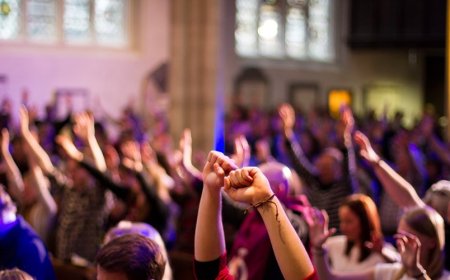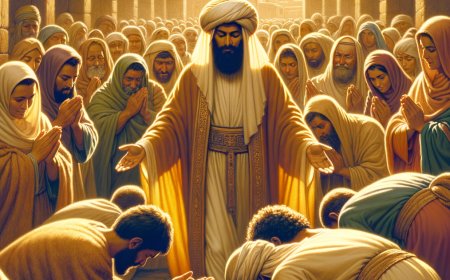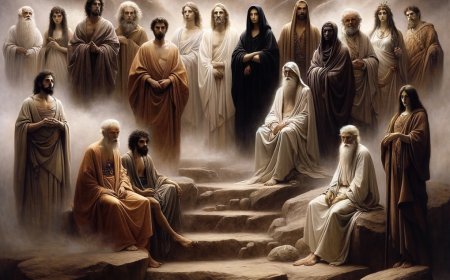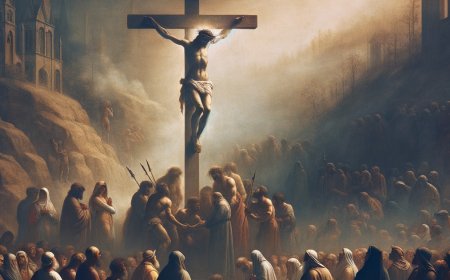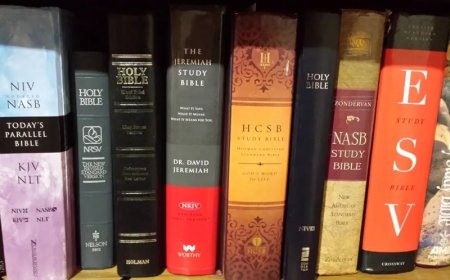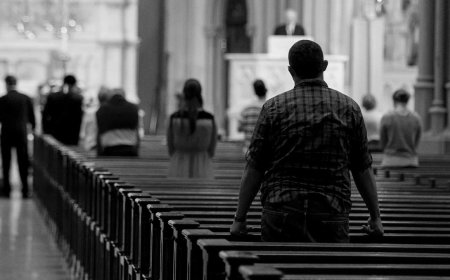Callings and Offices of the Gospel
The called of God are made by God and not by man. We will explain the difference between the called and the chosen and then we will go into each of the biblical offices and ministries.

Some people are called by God and some people are chosen, but all newborns are anointed by God with His Holy Spirit. “But the anointing which ye have received of him abideth in you, and ye need not that any man teach you: but as the same anointing teacheth you of all things, and is truth, and is no lie, and even as it hath taught you, ye shall abide in him.” 1 John 2:27.
The only difference among believers when they are born again, is the ministry in which they are appointed. Everyone has a different ministry, or mission, from God. Regardless of how small or great it is, we are all in the faith and body of Christ together. No one should ever let any man undermine their salvation.
First, we will explain the difference between the called and the chosen and then we will go into each of the biblical offices and ministries.
The Called
In St. Matthew 22:14, Jesus says that “For many are called, but few are chosen.” Many misinterpret this passage to justify their claim that not all people who are saved, will be saved, and that a person can be saved but still go to hell. They neglect to understand the entire message from St. Matthew chapter 22, which is referring to the children of Israel, whom God called but they refused Him, so He turned and gathered the Gentile nations to His wedding instead. This passage is not talking about born again believers.
Those who are called to the church are born again with the Holy Ghost and placed in the body of Christ as His bride, being prepared for the wedding. In fact, those in the body were predestined to be there according to God’s will. Romans 8:30 reads: “Moreover whom he did predestinate, them he also called: and whom he called, them he also justified: and whom he justified, them he also glorified.” So, anyone born again was called of God.
Among the millions of souls in the body of Christ, not everyone is a preacher or a prophet, some are there to contribute to the physical church while here in the world and to minister to those around them. Be it singing, praying, making phone calls, cleaning the church or anything that does not require a leadership position over the flock; because they are the flock. And whatsoever they are appointed to do, they do it for the pleasure of serving the Lord, and not grudgingly.
“For the promise is unto you, and to your children, and to all that are afar off, even as many as the Lord our God shall call.” Acts 2:39. “And we know that all things work together for good to them that love God, to them who are the called according to his purpose.” Romans 8:28. Other references to being called of God are: Romans 1:6, 1 Peter 5:10, and Colossians 3:15.
The Chosen
Those who are chosen are placed into leadership positions who are responsible for leading and teaching the flock of God, much like Jesus chose the disciples, “Have not I chosen you twelve...?” St. John 6:70. “And he gave some, apostles; and some, prophets; and some, evangelists; and some, pastors and teachers; for the perfecting of the saints, for the work of the ministry, for the edifying of the body of Christ:” Ephesians 4:11, 12. These positions are not to be taken lightly and those who fulfill them are taught by God himself and cannot be effectively be taught by man.
Chosen men and women of God have to go through more pressing trials and tribulations in order for them to understand their mission in leadership. They are examples to the flock so they must live the life they want to see others live for Christ.
The offices referred to in Ephesians 4 are biblical in nature and God-sanctioned. The apostles also spoke of a few other offices throughout the Epistles such as Bishops, Elders, and Deacons. Each of the offices have a different purpose, but they are all for the edification of the church.
Today’s church leaders have made-up offices and names for leadership positions that are not sanctioned by God, nor biblical. They have added degrees behind these made-up names to give themselves more weight above the flock. Such as Reverend, or Emeritus, or Dr. of Theology, yet none of these titles are biblical. But this only fulfills the scripture Christ spoke of in St. Matthew 23:15, which reads: “Woe unto you, scribes and Pharisees, hypocrites! for ye compass sea and land to make one proselyte, and when he is made, ye make him twofold more the child of hell than yourselves.”
Then there are false prophets and teachers who claim the titles of the offices such as Apostle, Bishop, or Prophet, but they are only claiming them for show. “But all their works they do for to be seen of men: they make broad their phylacteries, and enlarge the borders of their garments, and love the uppermost rooms at feasts, and the chief seats in the synagogues, and greetings in the markets, and to be called of men, Rabbi, Rabbi. But be not ye called Rabbi: for one is your Master, even Christ; and all ye are brethren.” St. Matthew 23:5-8.
So, what are the duties of the offices? We will begin with the least of the offices and work down to the one with the most responsibility.
Minister
A minister is simply a messenger of God who attends to the needs of others. The offices are all ministers of one another and to the congregation and even those in the world, regardless of what the title is, a minister is a duty, not an actual office. “But so shall it not be among you: but whosoever will be great among you, shall be your minister:” St. Mark 10:43.
Deacon
Deacons served the widows and the fatherless, attended to families while the disciples labored in the Word and doctrine, and they also followed along with the disciples during their travels and ministered to their needs. The book of 1 Timothy chapter 3, explains the qualifications of a Deacon like such:
8 Likewise must the deacons be grave, not doubletongued, not given to much wine, not greedy of filthy lucre;
9 holding the mystery of the faith in a pure conscience.
10 And let these also first be proved; then let them use the office of a deacon, being found blameless.
11 Even so must their wives be grave, not slanderers, sober, faithful in all things.
12 Let the deacons be the husbands of one wife, ruling their children and their own houses well.
Bishop
Bishops are a step above Deacons. The qualifications are similar except Bishops are expected to teach (the doctrine) whereas Deacons were not. They are also expected to take charge of the church when needed and should understand how to run it. Timothy was ordained a Bishop at Ephesus during Paul’s journey to Jerusalem.
1 Timothy chapter 3 reads:
1 This is a true saying, If a man desire the office of a bishop, he desireth a good work.
2 A bishop then must be blameless, the husband of one wife, vigilant, sober, of good behaviour, given to hospitality, apt to teach;
3 not given to wine, no striker, not greedy of filthy lucre; but patient, not a brawler, not covetous;
4 one that ruleth well his own house, having his children in subjection with all gravity;
5 (for if a man know not how to rule his own house, how shall he take care of the church of God?)
6 Not a novice, lest being lifted up with pride he fall into the condemnation of the devil.
7 Moreover he must have a good report of them which are without; lest he fall into reproach and the snare of the devil.
Elder
The Elder is not an office but literally older men who had experience in the Word and operation of the sanctuary and churches. Although they could serve in the office of a Bishop. There were Elders among the scribes and Pharisees who knew the law and served in the synagogues for years. They were also expected to understand how to run the church if needed. Peter was an Elder during the days of the early church because he had experience serving under the law, but now served with the other disciples. 1 Peter chapter 5 reads:
1 The elders which are among you I exhort, who am also an elder, and a witness of the sufferings of Christ, and also a partaker of the glory that shall be revealed:
2 feed the flock of God which is among you, taking the oversight thereof, not by constraint, but willingly; not for filthy lucre, but of a ready mind;
3 neither as being lords over God's heritage, but being ensamples to the flock.
Pastors
If a man is called to pastor, they are given the responsibility of leading the flock of believers and keeping the church in order. They are preachers of the Word of God and are expected to live the life they preach of and be an example of holiness to the church. There were pastors in the Old Testament and in the New, and they both have the same mission. “…and I will give you pastors according to mine heart, which shall feed you with knowledge and understanding.” Jeremiah 3:15.
Teachers
Teachers are gifted with the ability to teach the basics of the gospel to believers whether they are new to the gospel, seeking the Lord, or need guidance, exhortation or correction. Timothy proclaimed his calling as a teacher by saying: “whereunto I am appointed a preacher, and an apostle, and a teacher of the Gentiles.” 1 Timothy 1:11.
He was responsible for teaching the gospel to the Gentiles who had no knowledge of the ways of God until the coming of Christ. Paul encouraged Timothy to stay strong in the faith: “preach the word; be instant in season, out of season; reprove, rebuke, exhort with all longsuffering and doctrine.” 2 Timothy 4:2.
Evangelists
The Bible does not give an exact definition of an Evangelists, yet men today describe them as those who travel and teach the Word. However, that is not necessarily what they do. They are simply men who carry the Word of God to whomever it is meant for. Paul makes mention of the work of an Evangelists in 2 Timothy 4:5, which reads: “But watch thou in all things, endure afflictions, do the work of an evangelist, make full proof of thy ministry.”
According to the scripture, Paul warned Timothy that “…the time will come when they will not endure sound doctrine; but after their own lusts shall they heap to themselves teachers, having itching ears;” 2 Timothy 4:3. Attention to the Word and doctrine was an important task for men of God as it remains this day.
Prophetess
The prophetess is a woman whom God has chosen and anointed to bring forth edification to the body of Christ. She is given revelation and messages of spiritual things of God to pass on to the leaders of the church. She is in charge of the younger, less experienced women in the congregation and responsible for teaching them how to love their husbands, children, and maintain a holy lifestyle in the Lord.
She does not preach or have authority over the men who are chosen of God. She also ministers to widows, women and children in order to make sure they are in order. She lives a life of sanctification, sobriety, holiness, and does not meddle in other people’s affairs or fall into the trap of gossip and hearsay. This is a noble office for a woman and she should want to fulfill it and serve the Lord and the body of Christ. Her office is needed to nurture the body and keep peace.
Prophets
The office of the prophet goes back to Old Testament days and is the oldest of the offices, when God would send men with a message to inform the children of Israel of God’s will. Some people were used by God once and some were used many times. A prophet is simply a messenger of God, much like a preacher is today, to bring the Word of the Lord to the people. The problem though, is that there were many false prophets in the Old Testament as there are today in the church, who claimed to be sent of God with a message but are not from God at all. Jesus warned of such men saying: “Beware of false prophets, which come to you in sheep's clothing, but inwardly they are ravening wolves.” St. Matthew 7:15.
Prophets are also gifted with the ability to speak of future events, however, according to scripture prophesies come in parts and not as a whole. No man can predict the entirety of the plans of God in the future and no one can know what will be until the prophesy is completely revealed. The scripture says: “but whether there be prophecies, they shall fail; whether there be tongues, they shall cease; whether there be knowledge, it shall vanish away. For we know in part, and we prophesy in part. But when that which is perfect is come, then that which is in part shall be done away.” 1 Corinthians 13:8-10.
Prophesy in this age of the church of Jesus Christ is meant for the exhortation and encouragement of the church. “For ye may all prophesy one by one, that all may learn, and all may be comforted.” 1 Corinthians 14:31. Other times, God will send a messenger with a warning or vision of what is to come for the preparation of the church. When men are given these prophesies, they must be in line with God’s Word and will for the church and not out of the desires and wishes of he who prophesies.
For example, a prophesy for the church today would be a look into the distant future of the state of a city or country or even a person that God has plans to change, use, or destroy. But it has to come from the Word of God by scripture or it is not God’s message. Prophesies are rarely daily occurrences and come few and in between times. As Jesus said, beware of false prophets, you shall know them by their fruits.
Apostles
As any of the offices of the gospel, laboring for the Lord is not always glamorous. Men who are responsible for feeding the flock are put through trials and tribulations to make and mold them for the work the Lord has for them. They suffer persecution from many people and are hated by the world because they preach the truth of the gospel and Word of God. The office of the Apostle is an office not many men understand though they claim to be one.
Paul describes the struggles of the offices in 2 Corinthians as follows:
8 We are troubled on every side, yet not distressed; we are perplexed, but not in despair;
9 persecuted, but not forsaken; cast down, but not destroyed;
10 always bearing about in the body the dying of the Lord Jesus, that the life also of Jesus might be made manifest in our body.
The called of God are made by God and not by man. God has set a course for their ministries throughout their lives and they are compelled to follow that course, regardless of how they feel that day. They MUST preach the gospel. Apostles, however have an added burden to carry and a more stringent ministry. Paul explains this in 2 Corinthians 11 where he defends his apostleship:
21 I speak as concerning reproach, as though we had been weak. Howbeit whereinsoever any is bold, (I speak foolishly,) I am bold also.
22 Are they Hebrews? so am I. Are they Israelites? so am I. Are they the seed of Abraham? so am I.
23 Are they ministers of Christ? (I speak as a fool) I am more; in labours more abundant, in stripes above measure, in prisons more frequent, in deaths oft.
24 Of the Jews five times received I forty stripes save one.
25 Thrice was I beaten with rods, once was I stoned, thrice I suffered shipwreck, a night and a day I have been in the deep;
26 in journeyings often, in perils of waters, in perils of robbers, in perils by mine own countrymen, in perils by the heathen, in perils in the city, in perils in the wilderness, in perils in the sea, in perils among false brethren;
27 in weariness and painfulness, in watchings often, in hunger and thirst, in fastings often, in cold and nakedness.
28 Beside those things that are without, that which cometh upon me daily, the care of all the churches.
The office of an Apostle is not an easy office and not many men can endure the sufferings awaiting the Apostle. This is why God has to make an Apostle because no man would willingly become one on his own, it is a grueling ministry. However, there are men who claim this position but have not gone through God’s course. Paul says: “For such are false apostles, deceitful workers, transforming themselves into the apostles of Christ. And no marvel; for Satan himself is transformed into an angel of light. Therefore it is no great thing if his ministers also be transformed as the ministers of righteousness; whose end shall be according to their works.” 2 Corinthians 11:13-15.
The deepest point of the apostleship comes in 1 Corinthians 4:9-13, where Paul describes the actual characteristics of an Apostle.
9 For I think that God hath set forth us the apostles last, as it were appointed to death: for we are made a spectacle unto the world, and to angels, and to men.
10 We are fools for Christ's sake, but ye are wise in Christ; we are weak, but ye are strong; ye are honourable, but we are despised.
11 Even unto this present hour we both hunger, and thirst, and are naked, and are buffeted, and have no certain dwellingplace;
12 and labour, working with our own hands: being reviled, we bless; being persecuted, we suffer it:
13 being defamed, we intreat: we are made as the filth of the world, and are the offscouring of all things unto this day.
If a man can explain what Paul meant by apostles being last as it were appointed unto death, then they can be taken seriously as an apostle. Not many men today who claim to be an Apostle could endure such treatment from God or from the world. There is no glory in the apostleship, only pain and suffering and no fame, honor or sympathy. This is a calling that requires serious sacrifice of worldly possessions, positions, and prestige. But in the end, their works will testify of their authenticity.
Overall, callings and ministries are ordained of God and made for the building and strengthening of the church of Christ. If a person does not know or understand the purpose and will of God for the church, they can never fulfill their calling or ministry. This is why study of the Word and constant prayer is needed for anyone to answer a call from God.



